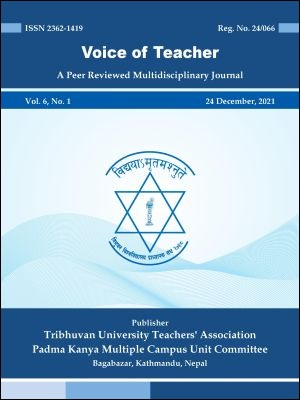The Narratives of Former Entertainment Workers in Nepal: An Explorative Study of Becoming and Being an Entertainment Worker
DOI:
https://doi.org/10.3126/vot.v6i1.44079Keywords:
Events, Entertainment-sectors, Themes, Problems, WomenAbstract
This paper explores experiences as being and becoming of entertainment Worker in Nepal. Entertainment sectors, conceptualized here, a place where girls and Women are kept for sexual purposes. In doing so, the timing of events model, and narrative theory were applied to explore how events timing changes the life experiences of former entertainment Workers. Twelve former entertainment Workers were selected from NGO's who were rescued and helped by Youth for Transformation. The oral narration was taken as an interviewing method. Their problems and narratives as being Workers, and the process of becoming, off timing stages of entertainment workers intertwined in family system/sub-system or outside inter-personal system, were recorded, transcribed, analyzed, and discussed as informed by thematic techniques, and off timing stage model.
Following timing of events model and narrative theory, five off timing events led sequential patterns in clients’ life were identified: a) chronic poverty and bigger family size led-sequences; b) single mother led-sequences; c) early child marriage led-sequences; d) love marriage led- sequences, and d) parent’s death led-sequences. Likewise, research generates the client’s construction of the four dominant themes were: a) stigmatization; b) enactment of social expectations; c) role mediation and feminization, and d) health condition.




